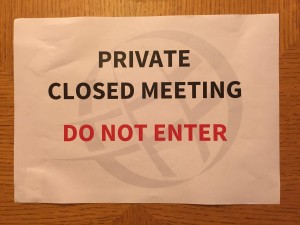The following is my submission during the Public Comment phase of the IANA Transition Proposal
The IANA Transition Proposal is a proposal to transfer existing apparent residual powers currently exercised by the United States Government in respect of the important Internet Assigned Numbers
Authority (IANA) function; day-to-day operations being carried out by ICANN under a contract awarded to it by the Federal Government.
It is notable and welcome that the Proposal appears to recognise, to a large extent, the need for the Corporation to have real and enforceable accountability to those whom the Corporation, in the future, will regulate, or have significant economic effects upon by virtue of the IANA role.
As the business goal of the Corporation is to “co-ordinate at the overall level the Internet’s system of unique names and numbers”, it can clearly be seen that this means ICANN must needs find ways to be held accountable to the whole world: that is to say, business, civil society and public authorities world-wide.
The Proposal contains many interesting features, ostensibly designed to achieve this goal. They may (or may not) do so to the needed extent. Others equally qualified to comment have already, and will, provide input on these specific features.
Accordingly I choose to focus this, my formal submission on the Proposal, to a more fundamental question, which I submit, is required to be answered before transition may proceed.
That question can be summarised as follows: ”Whence derive the powers?”. More specifically, it is submitted that as a pre-requisite of transition, it must be necessary to understand with complete clarity the following:
- the legal basis for the existing role of the agencies of the United States;
- under what existing statutory powers or proposed legislation the proposed transfer of powers from the United States to a California non-profit corporation is to take place; and
- precisely which powers are proposed to be transferred from the United States to the selected private sector body by virtue of the IANA transition.
It is axiomatic, and trite to say that the principle of the Rule of Law (not to mention the constitution of the US) demands a government of laws, not governance by men. Yet, it seems to this author, the Proposal curiously lacks the necessary fundamental background of the powers involved. It is submitted that it is only reasonable to expect that the Proposal should set this out with precision and clarity before delving into the technical mechanics of how a future ICANN, once removed from the benevolent oversight of the United States’ Department of Commerce, would operate.
To the writer, it appears to be envisaged in the Proposal, that post-transition the Corporation (ICANN) will have untrammelled powers to co-ordinate (that is to say: to regulate) the Internet’s unique system of names and numbers in accordance with ICANN policies and its world-view of the global interest.
It further appears that, post-transition, that the operator for-the-time-being of the IANA function (i.e. ICANN) is intended to have power (within ICANN’s mission and policies but without external oversight such as is currently exercised by the United States) to create, modify, and remove global and country-code top-level domains (gTLDs and ccTLDs).
As an entirely private sector corporation, it is hard to see where ICANN’s legal authority is intended to sit, post-transition. The power to compel another individual or corporation to regulatory compliance has to be founded either in contract, alternatively in statutory or prerogative power.
Further, as any other non-profit corporation, ICANN is free to enter into any contracts that it wishes, it remains hard to see whence (in the absence of some form of a deed of gift by the United States under existing statutory powers of the US Federal government) ICANN could henceforth derive a legal authority over the root zone database, which, although there are some questions about its very nature, has been previously claimed belongs to the United States, and without whose affirmative sanction, permissions, additions, modification and removal of entries may not currently be made.
In the absence of the needed clarity on the matters set out above, I cannot and do not support the Proposal as is.
Accordingly it is submitted that no changes to the status quo should be made unless and until the abovementioned deficiency has been rectified.



